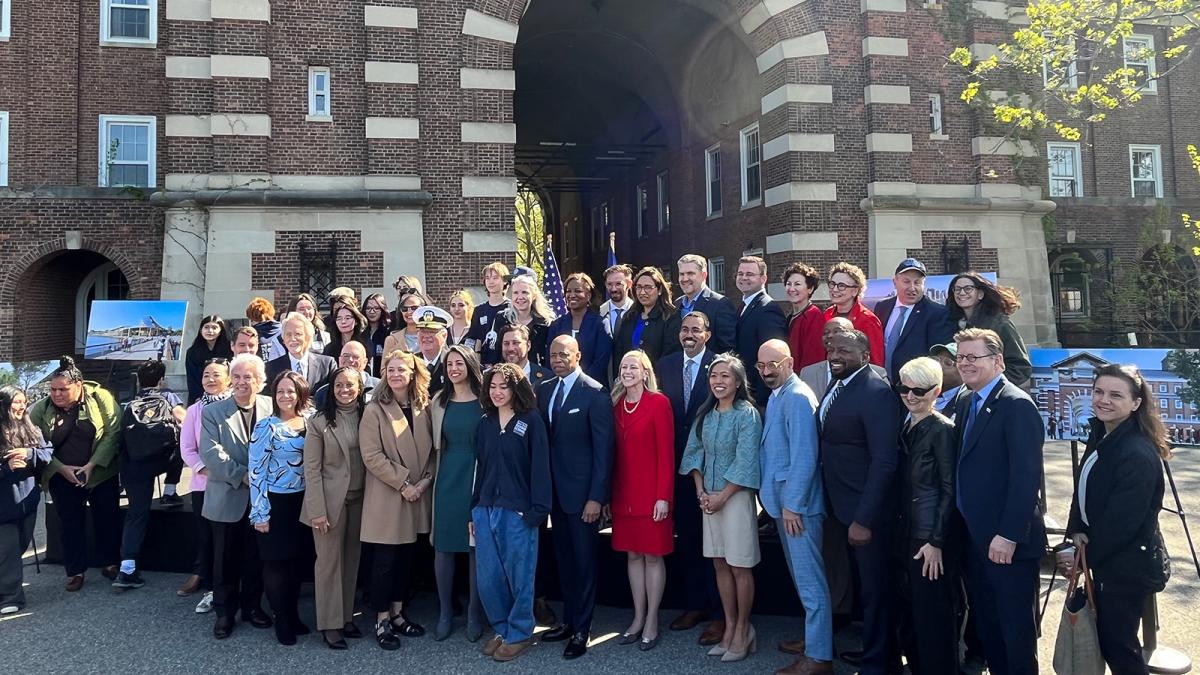
Pace University a Core Institution for World-leading Climate Center on Governors Island

‘The New York Climate Exchange’ to Address Global Climate Crisis
Pace University is part of a winning collaboration chosen by New York City Mayor Eric Adams and The Trust for Governors Island that will create a world-leading climate solutions center on the 172-acre island in the heart of New York Harbor.
As a core partner in “The New York Climate Exchange,” Pace University will leverage its proximity and programs – particularly in the areas of environmental law, climate justice, water science, sustainability, ESG, business, and technology – in creating a first-of-its kind international center for developing and deploying dynamic solutions to our global climate crisis, while also acting as a hub for New Yorkers to benefit from the rapidly evolving green economy. Mayor Adams and The Trust for Governors Island on Monday announced the winning team and its objectives.
“At Pace University, our students, faculty, and staff walk the walk of sustainability every day and we are thrilled to bring our expertise to the New York Climate Exchange," said Pace President Marvin Krislov. “As home to the nation's No. 1-ranked environmental law program – and our expertise in Land Use, climate justice, ESG and regional clean water initiatives – we are eager to work collaboratively and bring an interdisciplinary approach to climate actions that forge a more resilient future for New York City and communities worldwide. Our expertise, vast student and alumni network, and location in lower Manhattan provides the perfect springboard for creating opportunities in the green economy and engagement on Governors Island.”
The Exchange will host green job training and skills-building programs for residents to help them launch successful careers – and convene the world’s leaders and experts seeking climate solutions.
“Fighting climate change is a real battle and it's a battle that we are going to not only lead the nation, but we are going to win,” Mayor Adams said in his remarks. “And together we are creating climate opportunities across the city, investing in innovation and inventions, so that today's climate solutions become tomorrow's economic powerhouse. And I want to be clear, all New Yorkers will and must benefit from this major investment that we are making.”
Stony Brook University, as the anchor institution, will lead The Exchange while other partners, including President Krislov, will have a seat on The Exchange’s Board of Directors. Local partners include Pratt Institute, New York University, the City University of New York, SUNY Maritime College, Brookhaven National Labs and IBM.
In addition to local schools involved in The Exchange, the organization will also partner with Georgia Tech, University of Washington, Duke University, Rochester Institute of Technology and the University of Oxford. Additional partners are the Simons Foundation, one of the largest charitable organizations in the United States; social justice and local advocacy groups such as GOLES, The Point and WeACT for Justice; treasured New York institutions including the American Museum of Natural History; and research and business leaders such as Boston Consulting Group and Moody’s.
“Duke is thrilled to be a partner in the New York Climate Exchange and its community-first approach to confronting the complex impacts of climate change,” said Vincent E. Price, President of Duke University. “We look forward to bringing Duke’s academic, research and applied expertise to this critical partnership, which will help provide transformational solutions to the climate crisis.”
Key elements of The New York Climate Exchange include:
- An engaging and interactive living laboratory with 400,000 square feet of green-designed building space, including research labs, classroom space, exhibits, greenhouses, mitigation technologies, and housing facilities, including:
- All-electric powered campus with on-site solar electricity generation and battery storage with net-positive capability to serve the local grid
- 100% of non-potable water demand met with rainwater or treated wastewater collection
- 95% of waste diverted from landfills, making this one of the first sites in the U.S. to achieve True Zero Waste certification
- Climate-resilient design of new buildings, all raised to the Design Flood Elevation (DFE) of +18 feet with no basements and living shorelines
- All new and renovated buildings will meet the rigorous certification requirements of Living Building Challenge, and will be the first to achieve this certification in NYC
- A Research and Technology Accelerator that will source and nurture ideas, projects, and new ventures dedicated to solving the climate crisis.
- Workforce development opportunities for communities disproportionately affected by climate change — hosting 6,000 green job trainees annually — ensuring that New Yorkers most affected by climate change are well-positioned for new green economy jobs.
- Partnerships and collaborative grant opportunities with community-based organizations already working to mitigate the impacts of climate change.
- A Citizens’ Advisory Council, composed of key local stakeholders to ensure that partners’ and neighbors’ voices are heard and amplified as we jointly develop and implement new climate solutions, including those that affect low-income communities of color.
- A long-term plan for self-sufficient development that goes “beyond zero” toward net positive sustainability.
- Academic and community programs that prepare students at every level for careers focused on climate change solutions and environmental justice, encompassing hands-on learning, a semester “abroad” on Governors Island, fellowship and internship programs and continuing education.

About Pace University
Since 1906, Pace University has been transforming the lives of its diverse students—academically, professionally, and socioeconomically. With campuses in New York City and Westchester County, New York, Pace offers bachelor, master, and doctoral degree programs to 13,600 students in its College of Health Professions, Dyson College of Arts and Sciences, Elisabeth Haub School of Law, Lubin School of Business, School of Education, and Seidenberg School of Computer Science and Information Systems.


